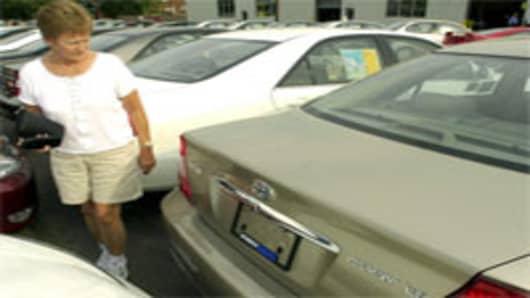The House approved on Friday a $2 billion extension of the "Cash-for-Clunkers" automobile sales incentive program.
The Democratic proposal would run through Sept. 30, 2010, and tap funds from an Energy Department loan guarantee program included in the economic stimulus package enacted in February.
An initial $1 billion in funding approved this summer to boost stagnant industry sales has already been exhausted, officials said.
Consumers stormed dealers over the past month to take advantage of federally backed rebates of up to $4,500 on trade ins of gas guzzlers for more fuel efficient vehicles.
Unofficial government and industry estimates show that close to 250,000 vehicles were sold under the program.
- How to Use the Program
The Senate is expected to act on the House bill.
Already a key senator, Energy Committee Chairman Jeff Bingaman, said he opposes using Energy Department funds for the auto program.
Another senator, auto industry ally Debbie Stabenow, said pushing the measure out of Congress would potentially take a lot of work compared to the extraordinarily swift action in the House.
The White House supports new funding for the program on grounds the initiative so far has provided a viable, national economic stimulus amid recession.
House Majority Leader Steny Hoyer said the additional money would come from funds Congress approved earlier in the year as part of a $787 billion economic stimulus bill.
Hoyer, D-Md., said that at the request of House Republicans — whose approval was required for swift passage — the bill would include provisions for government auditors to make sure the money was being spent as intended.
House Minority Leader John Boehner said it was unclear how many Republicans would support on the plan.
"There are a lot of questions about how the administration administered this program. If they can't handle something as simple as this, how would we handle health care?" the Ohio Republican told The Associated Press.
At the same time the Obama administration assessed its options amid concerns the $1 billion budget for rebates for new car sales may have been depleted. The program officially began last week and has been heavily publicized by automakers and dealers.
Called the Car Allowance Rebate System, or CARS, the program offers owners of old cars and trucks $3,500 or $4,500 toward a new, more fuel-efficient vehicle, in exchange for scrapping their old vehicle. Congress last month approved the plan to boost auto sales and remove some inefficient cars and trucks from the roads.
The Senate was not scheduled to vote on Friday but lawmakers hoped to win approval for additional funding next week.
Senate action is likely next week, making sure the program would not be affected by the sudden shortage of cash.
"Consumers have spoken with their wallets and they've said they like this program," said Rep. David Obey, D-Wis.
House members acted within hours of learning from Transportation Secretary Ray LaHood that the program — designed to help the economy as well as the environment — was out of funds. Under the program, car owners can receive federal subsidies of as much as $4,500 if they trade in their old car for a new one that achieves significantly higher gas mileage.
Sen. Carl Levin, D-Mich., said the administration assured lawmakers that "deals will be honored until otherwise noted by the White House." But he suggested that "people ought to get in and buy their cars."
At the White House, press secretary Robert Gibbs sought to assure consumers that the program is still running and will be alive "this weekend. If you were planning on going to buy a car this weekend, using this program, this program continues to run."
Gibbs would not commit to any timeframe beyond that.
It was unclear how many cars had been sold under the program.
John McEleney, chairman of the National Automobile Dealers Association, said many dealers have been confused about whether the program will be extended and for how long. Many had stopped offering the deals Thursday after word came out that the funds available for the refunds had been exhausted.
The clunkers program was set up to boost U.S. auto sales and help struggling automakers through the worst sales slump in more than a quarter-century. Sales for the first half of the year were down 35 percent from the same period in 2008, and analysts are predicting only a modest recovery during the second half of the year.
With so much uncertainty surrounding the program, North Palm Beach, Fla., dealer Earl Stewart said he planned to continue to sell cars under the program but would delay delivering the new vehicles and scrapping the trade-ins.
"It's been a total panic with my customers and my sales staff. We are running in one direction and then we are running in another direction," he said.


